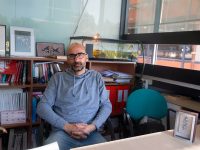 |
||
|
In recent years many European Union countries have shown a clear intention to incorporate new forms of territorial administration and spatial planning. In different areas and spheres of government there is a clear desire to move towards new ways of understanding territory, to design and evaluate policies and to promote citizens’ participation. For this reason we speak of the emergence of a new land culture, retrieving landscape, with land representing cultural identity and reference, of multi-functional lands, intelligent lands, sustainable management, public consultation and participation. In Spain the scenario has been different. For fourteen years many jobs have been created, albeit with low added value, which awoke great expectations. A decade in which the «money illusion» and the feeling of prosperity pervaded large sectors of society, but with negative consequences –perhaps unintended or unanticipated– on issues related to land and environment. Above all, reference points and landscapes marking our identity and recent history have undergone such severe deterioration as to become «banal». This «urBANALization» of our lands, as Francesc Muñoz would say, this creation of «lands without discourse», without a future collective purpose held up by moral values. This would be a way of summarizing the events presided over by the generalization of sprawling residential development models, which could well be defined as «non-places» where almost everything is urban but hardly anything is city. The social, cultural and political consequences have been slower. A diffuse opacity and permissive complicity have been consolidated of large social sectors playing the «win-all» game. After some time, society in Spain –in general– and Valencia –in particular– has realised more clearly the present and future consequences of a decade and a half of intemperance, excess and mismanagement of land, as well as the economic, social, environmental and political consequences. These range from those related to excessive dependence on economic activity and employment linked to the residential construction sector, which now becomes obvious, to the irreversible disappearance of collective historical and cultural reference points. There have also been episodes of governments’ «capture», especially at the local and regional scale, and of corruption in politics and in policies. A lengthy process that has led to «corruption in urban development», as described by F. Gaja, and no less disturbing is the increase in cases of administrative and political corruption, in which public ethics have been badly damaged and, likewise, the reputation of Spain and the Valencia region. Valencia should join those countries that have decided to embrace a «new land culture». Not only because it bestows identity and cultural values on land, but because land quality is one of our best assets in a context in which we can no longer compete with Germany, nor can we do so with emerging economies. I would like to think a change is stirring in our collective imagination. Even before the economic trend announced a stop to residential construction, there were already voices expressing their dismay and dissatisfaction with the style and substance of a runaway process that did not herald a happy ending. And it is upon these reflections that a consistent discourse can be built, which places more emphasis on spatial planning and cohesion than on growth, which gives priority to cultural, historic and sustainable criteria over any other options or practices that provide short-term electoral benefit or immediate profits. Positive and proactive discourse, participated in by citizens who must become involved and understand that when a territory or a unique landscape is lost, not only does a part of our history and culture disappear, but so too do future opportunities. We must persevere so that this way of thinking is shared by a large majority of society.
Our greatest weakness lies in our inability to identify, agree and promote an agenda to overcome the challenges in a coordinated way, to develop a set of public policies towards greater territorial cohesion and coherence. Our biggest problem is no longer information. There is an excess of diagnoses made at local, regional, national and European level. There is an excess of plans and projects and an excess of rhetoric. What is missing is the political willingness and culture needed to set out upon the path of democratic governance and good territorial governance. Our main problem is still a cultural and political one, which goes far beyond political expression and administrative boundaries. And no encouraging signs are visible of change in the near future. This is a shared political responsibility that is rooted in cultural contexts and reaches society as a whole. Therefore, we are all responsible, each in our own areas of responsibility, and to the extent these can contribute to change. Ranging from the numerous branches of government to those responsible for local government, to the work of professionals, academics, citizens actively engaged in platforms or movements or people showing solidarity with future generations, as yet unborn. Each and every one of us should be able to place the defence of general interests and a more respectful way of relating to the environment above all other considerations. Considering the geographer Vidal de La Blache stated that «no civilized country has been the sole artisan of their own civilization», while also considering that one generation can cause irreparable damage to an area. It is work that makes it possible to change the cultural context from which the social perception of the majority can be changed in relation to the use of resources or landscape as part of our culture, public good and legacy. And that is when better coordinated policies, with greater and clearer willingness to cooperate, will improve efficiency. Things can be done differently. In fact they can even be done reasonably well. It just takes political willingness to promote more sustainable territorial development. Territorial strategies should serve to inspire and really guide spatial planning policy. Land is much more than a just a resource or a prop upon which to establish activities. Land is culture, identity and heritage. It is a public good, shared or common space and a legacy. And we have no right to overexploit it, to exhaust or devastate it, because so doing we endanger collective welfare and forfeit the future. The current territorial dynamics jeopardize collective welfare and influence future generations. Therefore, territorial governance must be at the heart of the debate as a strategic political objective. Here we should understand «political» to mean «citizen». In other words, it is a matter of concern to everyone and not just politicians or experts. We must demand more information, greater participation in decision-making and more collective and generational respect. In short: more democracy. Thus the public debate around these issues is both necessary and urgent. Meanwhile, no spatial planning model has been agreed upon at the regional level, as has happened in dozens of European regions which have long pursued prudent and wise management of their resources; nor are sub-regional plans available along the lines advised by the European authorities or based on common sense; so far models of funding councils (and probably political parties) remain unchanged. This being the case, we must press forward with the public debate, making this a political issue and, on every level –especially at the local level– demanding more caution, more responsibility, implementation of new practices and other forms of government when it comes to territorial planning. This must be pursued until we manage to place the issue as a problem affecting the majority and until we manage to consolidate a new culture as far as land use is concerned. It is therefore very important to emphasize the need to encourage a public debate about our territorial model, about what we wish to sell, besides land, in the immediate future, on how we want to be in twenty years time and what we can do to achieve this. Joan Romero. Full Professor of Geography, University of Valencia. |
© M. Lorenzo One of the consequences of the growth experienced in Spain in the last decade has been the deterioration of land. These years have witnessed sprawling residential development models where everything is urban but nothing is city. «For fourteen years many jobs have been created awaking great expectations but with negative consequences –perhaps unintended or unanticipated– on issues related to land and environment» «When a territory or a unique landscape is lost, not only does a part of our history and culture disappear, but so too do future opportunities. We must persevere so that this way of thinking is shared by a large majority of society»
|
|
© Mètode 2011 - 68. Online only. After the Crisis - Winter 2010/11






